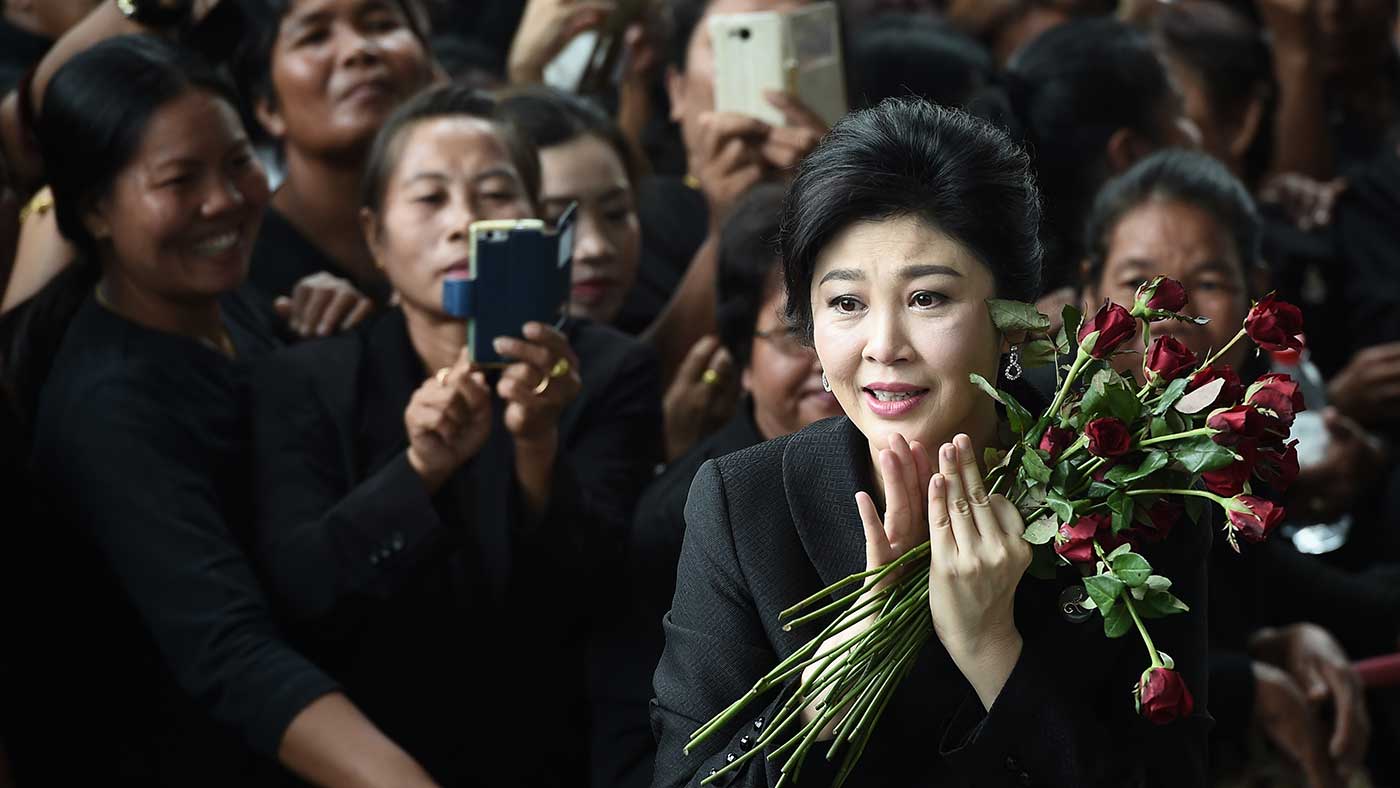Yingluck Shinawatra 'flees' ahead of a court verdict
The former Thai prime minister may have escaped via the Cambodian border, Thai police say

A free daily email with the biggest news stories of the day – and the best features from TheWeek.com
You are now subscribed
Your newsletter sign-up was successful
Yingluck Shinawatra left Thailand ahead of a Supreme Court verdict in a negligence trial brought by the junta that overthrew her, sources close to her family told Reuters.
The 50-year-old former prime minister faces ten years in prison for negligence over a rice subsidy programme that cost the government billions of dollars.
While Thai broadcaster PBS said Yingluck Shinawatra could not attend court because of an ear infection, CNN and Reuters said she was on the run.
The Week
Escape your echo chamber. Get the facts behind the news, plus analysis from multiple perspectives.

Sign up for The Week's Free Newsletters
From our morning news briefing to a weekly Good News Newsletter, get the best of The Week delivered directly to your inbox.
From our morning news briefing to a weekly Good News Newsletter, get the best of The Week delivered directly to your inbox.
“She has definitely left Thailand,” Reuters said, citing a source in her Puea Thai Party.
Deputy Prime Minister Prawit Wongsuwan told reporters that police were investigating reports Yingluck had left via Koh Chang, an island close to the Cambodian border. The Supreme Court issued an arrest warrant and rescheduled the verdict to 27 September.
If Yingluck has fled, her opponents would feel feel vindicated. “It does not help with Thailand’s division and polarisation,” Thitinan Pongsudhirak, director of the Institute of Security and International Studies at Chulalongkorn University, told Reuters.
Thaksin Shinawatra, her brother, was overthrown in a 2006 coup and fled into exile to escape a corruption conviction. The struggle between the Shinawatra family's political movement, the Bangkok-centered royalists and the pro-military elite has caused years of turmoil in Thailand.
A free daily email with the biggest news stories of the day – and the best features from TheWeek.com
Arrest warrant issued for former Thai PM Yingluck Shinawatra
25 August
A Thai court has issued an arrest warrant for former prime minister Yingluck Shinawatra after she failed to appear in court to hear the verdict in her long-running trial on negligence charges.
Yingluck, who was deposed in 2014 during a military coup, was charged in connection with a botched rice-buying scheme, which cost Thailand billions of dollars.
She "faced up to 10 years in prison if convicted and a life ban from politics under the new military-drafted constitution," The Guardian reports.
Her lawyer told the court that she was too ill to attend, but he "did not provide a medical certificate, leading the court to refuse the excuse", says CNN.
The Supreme Court said: "We don't think that the defendant is ill. We think that the defendant is hiding or has fled."
Judges reschduled the verdict hearing for 27 September and ordered Yingluck to forfeit her bail of 30 million baht, about £700,000.
"Unlike her brother, former prime minister Thaksin Shinawatra, who fled the country and was convicted in absentia on corruption charges," says the New York Times, "Yingluck has remained in Thailand and fought the charges against her."
Thousands of police had been deployed in response to fears that a guilty verdict would lead to violent protests. Despite the negligence charges, Yingluck remains very popular with many Thai people.
-
 Will increasing tensions with Iran boil over into war?
Will increasing tensions with Iran boil over into war?Today’s Big Question President Donald Trump has recently been threatening the country
-
 Corruption: The spy sheikh and the president
Corruption: The spy sheikh and the presidentFeature Trump is at the center of another scandal
-
 Putin’s shadow war
Putin’s shadow warFeature The Kremlin is waging a campaign of sabotage and subversion against Ukraine’s allies in the West
-
 Epstein files topple law CEO, roil UK government
Epstein files topple law CEO, roil UK governmentSpeed Read Peter Mandelson, Britain’s former ambassador to the US, is caught up in the scandal
-
 Iran and US prepare to meet after skirmishes
Iran and US prepare to meet after skirmishesSpeed Read The incident comes amid heightened tensions in the Middle East
-
 Israel retrieves final hostage’s body from Gaza
Israel retrieves final hostage’s body from GazaSpeed Read The 24-year-old police officer was killed during the initial Hamas attack
-
 China’s Xi targets top general in growing purge
China’s Xi targets top general in growing purgeSpeed Read Zhang Youxia is being investigated over ‘grave violations’ of the law
-
 Panama and Canada are negotiating over a crucial copper mine
Panama and Canada are negotiating over a crucial copper mineIn the Spotlight Panama is set to make a final decision on the mine this summer
-
 Why Greenland’s natural resources are nearly impossible to mine
Why Greenland’s natural resources are nearly impossible to mineThe Explainer The country’s natural landscape makes the task extremely difficult
-
 Iran cuts internet as protests escalate
Iran cuts internet as protests escalateSpeed Reada Government buildings across the country have been set on fire
-
 US nabs ‘shadow’ tanker claimed by Russia
US nabs ‘shadow’ tanker claimed by RussiaSpeed Read The ship was one of two vessels seized by the US military